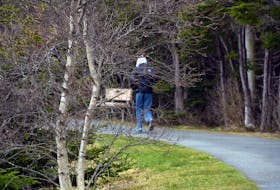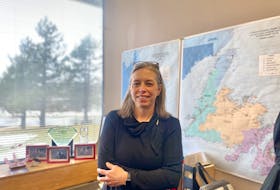Noel Priddle, 50, was the first to die after three men from Newfoundland were injured in an explosion while working on a boat parked between two houses in downtown Iqaluit.
Priddle, originally from Victoria, had been living in Carbonear with his partner, Diane Kennedy, for the past eight years. He was a carpenter and had spent 20-odd years mastering his craft in the field. Priddle had been working in Iqaluit for 10 months — working eight weeks in Nunavut, then spending three weeks in Newfoundland — at the time of the tragic accident.
The couple had known each other as teenagers, but gone in separate directions after their high school graduation, with Priddle moving away from Newfoundland until November 2008, when he returned to spend time with his mother, who is now deceased. They reconnected in May of that year, fell in love and were happily together since.
“He always had that smile and that laugh you can never forget,” Kennedy says.
Priddle was a family man and showed no end of love to his son, 19, who lives in Halifax and whom he spoke with weekly, or Kennedy’s daughters, one in Carbonear, one in Boston. He was close with his three surviving sisters.
“His son was everything to him,” says Kennedy. “Every conversation ended with the words, ‘Dad loves ya.’”
Priddle last saw his son in March, when he went to Halifax on his way home to Carbonear during one of his breaks to celebrate his son’s birthday.
He had a close bond with Kennedy’s youngest daughter, whom he had known since she was nine. Kennedy laughed remembering how Priddle once put on her daughter’s dance costume and danced around for her, and reminisced about how he would warn her to be careful each time she took the car after she got her driver’s licence.
“If there were things she wanted she would come to me and if I couldn’t do it she would go to Noel and if he could give it to her, he would,” Kennedy says of Priddle’s relationship with her daughter.
Priddle had made a point of scheduling his time home and away so he was able to be in Carbonear for Kennedy’s daughter’s high school graduation on June 22.
Kennedy’s grandsons would often ask where Noel was when they spoke over video-chat and would call out to him if they could hear him somewhere in the background, she said.
A lover of 1980s music, “he used to drive me nuts,” Kennedy says, quizzing her on the artist and name of the song every time one came on the radio, information he knew too well.
Priddle enjoyed the outdoors, particularly riding the trails around Carbonear and Victoria on his quad, an activity the couple spent the last three days of his final visit home enjoying.
Priddle liked to help those around him, Kennedy says.
“He would spend time helping others and he was always there to lend a helping hand.”
It was his readiness to help his neighbours that acquainted him with John Manning, the other man who died in the accident in Iqaluit.
Kennedy had known Manning — who vacationed at his cabin in Carbonear — for about a year when he called to ask if Priddle could come over to help with some repairs at his cabin.
Shortly after their meeting, Manning invited Priddle to come work for his company, KCM Maintenance and Construction. Priddle accepted the offer and on Sept. 25, 2016 he flew to Iqaluit to begin his work.
In Iqaluit, Priddle lived with two other men from Newfoundland, one of whom, age 26, was also injured in the explosion, but survived and is living in Nova Scotia.
Priddle was a member of the Elks Lodge, where his hat now rests in a display case.
According to Kennedy, he enjoyed working in Iqaluit and was close with his coworkers at KCM Maintenance and Construction.
“If they needed anything to get done, they would call on Noel to do it,” she says.
For Kennedy, as for others, there remain many unanswered questions surrounding the accident, which she is hopeful investigations by the chief coroner of Nunavut and Workers’ Safety and Compensation Commission in Nunavut will be able to answer.
Priddle always “called like clockwork,” Kennedy says. She received phone calls from him on his first break, on his lunch break and between 6:30-6:45 in the evening. When she did not receive that third phone call on July 6, Kennedy knew something was wrong.
At 7:23 p.m., Kennedy received a call informing her that Priddle, who had been back in Iqaluit for less than a week, had been injured in an explosion. At 8:15 p.m., she received a second call, saying he had died.
“As to how it happened, my only concern was that he didn’t suffer,” Kennedy says of her interest in the investigation.
While knowing that information may not give her peace of mind, she feels it would help. Priddle spent 2 ½ hours under the intensive care of doctors before he succumbed to his injuries.
On the Friday evening following the explosion, Priddle’s body was flown to Ottawa, where the two other victims were being treated, to be embalmed, before being flown to Newfoundland the following Tuesday. Priddle was laid to rest in Carbonear on July 13.
“The support that has come out from Iqaluit has just been amazing,” says Kennedy, who has received ongoing calls and messages from people she never met, but who were touched by Priddle’s presence in their lives.









